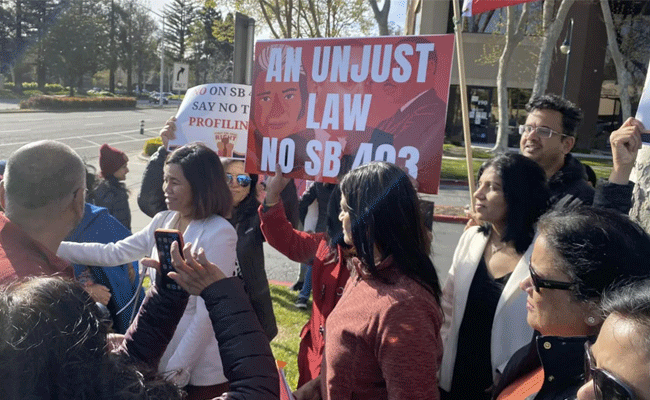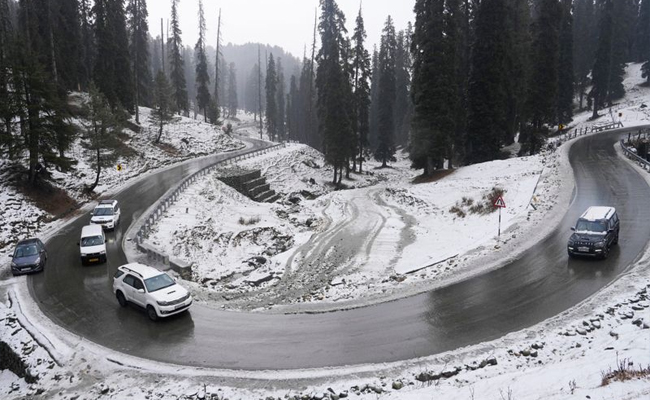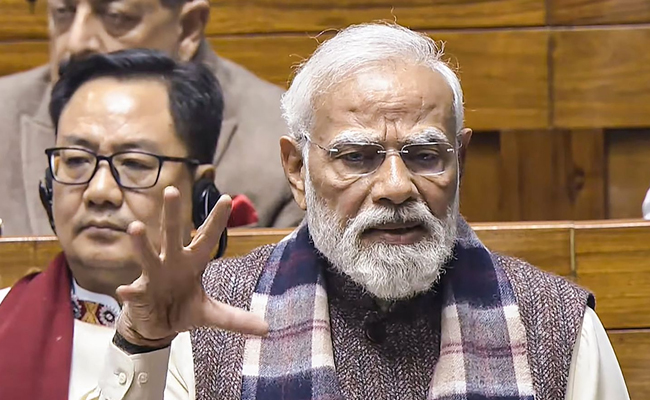Washington (PTI): The California Senate has overwhelmingly passed a legislation seeking to explicitly ban caste discrimination, in a historic move that would make America's most populous State also the country's first to outlaw caste-based bias.
State Senator Aisha Wahab, the first Muslim and Afghan American elected to the state legislature, introduced the bill last month.
Passed by 34-1 vote, the bill SB 403, would make California the first US State to add caste as a protected category in its anti-discrimination laws.
Promoters of the bill, being led by non-profit Equality Lab, said that a similar bill is being introduced in the State House of Representatives, before it can be sent to the Governor to be signed into a law.
The bill adds caste as a protected category to an existing law, the Unruh Civil Rights Act, which provides that all people in California are entitled to the full and equal accommodations, advantages, facilities, privileges, or services in all business establishments.
The bill provides explicit protections to those who have been systemically harmed due to caste bias and prejudice. It also provides firm legal consequences for those seeking to avoid responsibility or ramifications for permitting or participating in caste discrimination and caste-based violence.
This landmark bill comes just weeks after the California Senate Judiciary Committee unanimously passed SB403 in April.
Earlier this year, Seattle became the first US city to outlaw caste discrimination after its local council passed a resolution moved by an Indian-American politician and economist. The resolution, moved by Kshama Sawant, an upper-caste Hindu, was approved by the Seattle City Council by six to one vote.
It also follows the resolutions to designate caste as a protected category passed by the California Democratic Party, the California State University system, the Alphabet Workers Union, tech giants like Apple and Cisco, and others.
Seattle Council member Sawant welcomed the passage of the bill by the California State Senate.
Following our historic victory in Seattle in February, the California Senate has voted in favour of banning caste discrimination, Sawant said.
"The bill now goes to the Assembly. Anti-caste activists, working people, union members, and my socialist Council office built a fighting movement to win in Seattle, creating national and even international momentum. Solidarity to all fighting oppression under capitalism!" she said.
"On behalf of all Dalit Californians and caste-oppressed people around the world, we are ecstatic that the California Senate has passed SB403 off the Senate floor. This is a win rooted in years of Dalit feminist organising, and we are just getting started in making the state safe for our entire caste-oppressed community," said Thenmozhi Soundararajan, Equality Labs executive director and author of The Trauma of Caste.
Civil rights organisation Equality Labs was the brain behind the anti-caste discrimination resolution in Seattle. It has been spearheading a nationwide campaign.
"We know that we have a long journey ahead of us with this bill, but we have made history with this vote and are proud to look forward to working with the California Assembly on this historic bill! Equality Labs thanks all of the partners in Californians for Caste Equity who worked tirelessly to get us this far," Soundararajan said.
Tanuja Gupta, law student, activist, and a former Google engineering programme manager, said ending caste discrimination will soon no longer be an opt-in for a California-based company like Google, but a legal requirement of its existence.
Deelip Mhaske, president of Foundation For Human Horizon, congratulated State Senator Wahab for introducing the bill in the California Senate.
"This is a win for the Indian Constitution framed by Dr B R Ambedkar's equality principle," Mhaske said.
Indian American Muslim Council president Mohammad Jawad commended the California Senate for passing the bill.
"This is a historic moment for the Dalit community, which has been fighting against caste-based discrimination for generations. The passage of this bill sends a strong message that caste discrimination has no place in California. The bill will provide much-needed protection to Dalits and others who face discrimination based on their caste," he said.
"We urge the California Assembly to pass this bill without delay, and for Governor Newsom to sign it into law. We also call on other states and the US Congress to follow California's lead in recognizing caste discrimination as a form of discrimination and taking steps to address it. Discrimination based on caste is a violation of human rights and must be eradicated wherever it exists," said IAMC executive director Rasheed Ahmed.
California, a western US state located along the Pacific Coast with nearly 39.2 million residents, is the most populous US state and the third-largest by area.
Many Indian Americans fear that codifying caste in public policy will further fuel instances of Hinduphobia in the US.
Over the last three years, ten Hindu temples and five statues, including those of Mahatma Gandhi and Maratha emperor Shivaji, have been vandalised across the US as an intimidation tactic against the Hindu community.
Indian Americans are the second-largest immigrant group in the US. According to data from the 2018 American Community Survey (ACS), which is conducted by the US Census Bureau, there are 4.2 million people of Indian origin residing in the United States.
India banned caste discrimination in 1948 and enshrined that policy in the Constitution in 1950.
Let the Truth be known. If you read VB and like VB, please be a VB Supporter and Help us deliver the Truth to one and all.
Rajouri/Jammu (PTI): Traffic on the Mughal and Sinthan Top roads, which provide alternate connectivity to Kashmir, was temporarily suspended on Sunday due to light to moderate snowfall in the high-altitude areas of Jammu and Kashmir, officials said.
However, traffic on the 270-kilometre Jammu-Srinagar national highway -- the only all weather road linking Kashmir with the rest of the country -- was plying as usual despite intermittent rains that ended the over one-and-a-half months long dry spell, they said.
ALSO READ: India overpowered by Minhas' big hundred and pacers as Pakistan clinch U19 Asia Cup
The Mughal road, which connects the twin border districts of Poonch and Rajouri with south Kashmir's Shopian, was closed for traffic as a precautionary measure after more than three inches of snow was recorded at Peer Ki Gali on Sunday afternoon.
A group of three tea vendors are left stranded on the road and efforts are on to evacuate them to safety, officials said.
After they were trapped in the snow, the vendors made passionate appeals through video messages urging the authorities to rescue them. The Border Roads Organisation has taken up snow clearance work and is trying to reach the stranded persons, officials said.
The Sinthan Top road, which connects Kishtwar and Doda districts in Jammu with south Kashmir's Anantnag, was also closed after moderate snowfall in the higher reaches.
Both the mountainous roads usually remain closed for several months due to heavy snowfall during winter.





